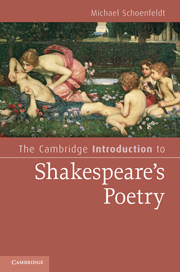Book contents
- Frontmatter
- Contents
- Acknowledgments
- Chapter 1 Shakespeare and English poetry
- Chapter 2 Shakespeare's banquet of sense
- Chapter 3 Constraint and complaint in Lucrece
- Chapter 4 Mysteries of the Sonnets
- Chapter 5 Time and mortality in the Sonnets
- Chapter 6 Friendship and love, darkness and lust
- Chapter 7 Solitary and mutual flames
- Chapter 8 Fantasies of Shakespearean authorship
- Notes
- Further reading
- Index
- Cambridge Introductions to Literature
Chapter 8 - Fantasies of Shakespearean authorship
Published online by Cambridge University Press: 05 June 2012
- Frontmatter
- Contents
- Acknowledgments
- Chapter 1 Shakespeare and English poetry
- Chapter 2 Shakespeare's banquet of sense
- Chapter 3 Constraint and complaint in Lucrece
- Chapter 4 Mysteries of the Sonnets
- Chapter 5 Time and mortality in the Sonnets
- Chapter 6 Friendship and love, darkness and lust
- Chapter 7 Solitary and mutual flames
- Chapter 8 Fantasies of Shakespearean authorship
- Notes
- Further reading
- Index
- Cambridge Introductions to Literature
Summary
Dear son of memory, great heir of fame,
What need'st thou such weak witness of thy name?
– John MiltonOne of the great mysteries of English literary history is not “who wrote Shakespeare” but rather “why does the question continue to be asked so frequently, and fervently?” There are probably more conspiracy theories attached to the works historically identified with Shakespeare than to any other body of work in the English literary canon. It is easy for early modern scholars to get cranky about these various theories, particularly when so many notions are mired in snobbery or prejudice, and when there is indeed so little to back them up. We should try, though, to see the gamut of theories as a kind of accidental tribute to the miracle of these works. It is as if their authorship were so magical that it could never be explained by the life or experience of any single individual.
Doubts about Shakespeare's authorship emerge rather late, more than 200 years after his death in 1616. They are largely a product of class and educational snobbery, post-Romantic notions of poetic genius, and historical anachronism. Anti-Stratfordians, as those who doubt Shakespeare's authorship of Shakespeare's works are frequently called, are typically skeptical that a kid from the countryside who lacked a university education and an aristocratic upbringing could become England's most celebrated poet. They also assume anachronistically that the lack of documentation around Shakespeare compared to the typical manuscripts and annotated library of a post-Romantic writer is a sign of some conspiracy that needs to be addressed.
- Type
- Chapter
- Information
- The Cambridge Introduction to Shakespeare's Poetry , pp. 130 - 143Publisher: Cambridge University PressPrint publication year: 2010

